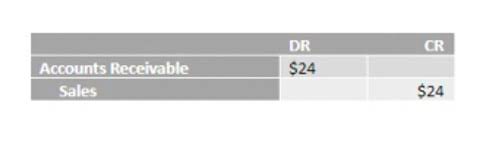Как Эффективно Запоминать Информацию: Лучшие Техники И Способы
24 Kasım 2022Indeksy giełdowe: Znaczenie i informacje szczegółowe
29 Aralık 2022
Attaining the CPA designation signals a high level of competency, ethical standards, and knowledge in accounting practices. The AICPA exists to provide its 421,000 members in 130 countries with the resources, information, and leadership to provide CPA services in the highest professional manner. If all you need is help filing a relatively simple return, though, you may not need the full services of a CPA; a non-CPA tax preparer, or even do-it-yourself tax software, may be enough to get your taxes done. Typically, an accountant is a person who has a degree in accounting from a higher education institution. However, this is not an official requirement because the general term “accountant” is largely unregulated in the U.S.
- In my experience, the best way to learn to audit was to actually be an auditor, which I did for many years out of college working in public accounting.
- Large companies may have their accounting departments for this complicated task, while small businesses and individuals use the accounting expertise of these public accounting firms.
- The section with writing tasks are worth 15% and task-based simulations count for 35%.
- Large public companies enlist the help of CPA firms annually in order to provide the SEC with audited financial statements and the IRS with their corporate tax return.
Role and Responsibilities of a CPA
Advisory services offered by CPAs encompass financial planning, risk management, and even forensic accounting, where they uncover financial irregularities and fraud. Accountants help businesses maintain accurate and timely records of their finances. Accountants are responsible for maintaining records of a company’s daily transactions and compiling those transactions into financial statements such as the balance sheet, income statement, and statement of cash flows. Accountants also provide other services, such as performing periodic audits or preparing ad-hoc management reports. Besides tax advising and preparation, CPAs might specialize in auditing, bookkeeping, consulting, management or financial advising and planning, to name just a few.
What are the duties of a CPA?

I also really enjoy the client education aspect of my work when I can help client accounting team members learn additional skills or be a resource to answer questions and resolve problems. In 2021, I decided to take the next step in my accounting career journey, and I am now a what is public accounting self-employed accounting consultant and business advisor. I was able to put my technical accounting and client service skills to use in working with my own clients. It’s been really interesting to see accounting from another perspective as part of an internal accounting team.
Key Soft Skills for CPAs
- This may influence which products we review and write about (and where those products appear on the site), but it in no way affects our recommendations or advice, which are grounded in thousands of hours of research.
- As a result, all professional accounting designations are the culmination of years of study and rigorous examinations combined with a minimum number of years of practical accounting experience.
- The teachers there are wonderful and really prepared me well for a future in accounting.
- If an event has a financial implication for a business unit, it must make a record of such an event.
- For example, a firm cannot prepare the financial statements of a client and audit those statements.
- Public accounting can be viewed as firms of accountants that serve clients such as businesses (retailers, manufacturers, service companies, etc.), individuals, nonprofit organizations, and governmental organizations.
Accounting is the art of recording, classifying, and summarizing transactions and events. In the first place, we maintain the records of transactions by writing various accounting books like journals and ledgers, etc. Their pivotal role in ensuring financial accuracy and transparency is indispensable in the modern business landscape. Financial analysts, often CPAs, conduct thorough analyses of financial data to inform investment decisions and assess the financial health of companies.

With their unique skill set, forensic accountants contribute to upholding financial transparency and integrity within organizations and legal contexts. Forensic accountants utilize their CPA expertise to investigate financial irregularities and potential fraud. Beyond traditional accounting tasks, CPAs also serve as trusted advisors to their clients, offering insights on a wide array of business matters. This duty is paramount as financial statements form the backbone of informed decision-making for investors, regulators, and other interested parties. It’s imperative that candidates prepare extensively for each section, not only to pass but also to ensure they’re ready for the multifaceted challenges they’ll face as CPAs.
- If you are interested in starting or running a business, the MBA program will help you prepare.
- CPAs are often the people who are called in to conduct audits — assessments of a business’s paperwork and financial statements.
- Taxation is a labyrinthine world, riddled with regulations and constantly changing laws.
- In addition to fraud detection, forensic accountants often participate in litigation support, valuing businesses during disputes, or assessing potential financial damages in legal cases.
- Because of the simplified manner of accounting, the cash method is often used by small businesses or entities that are not required to use the accrual method of accounting.
- So, it’s time to take a closer look at the core functions of public accountants, breaking down the major directions of their practice and the regulatory framework they work within.
- Besides, they have to grapple with the advent of blockchain technology and cryptocurrencies.
Do you already work with a financial advisor?
The healthcare landscape is marked by constant changes in government policies and insurance regulations, making it a challenging environment for CPAs. Accurate financial reporting and compliance are paramount, as errors can result in regulatory penalties and financial instability for healthcare organizations. Between 2019 and 2021 general government expenditures as a percentage of GDP increased by 5.4 percentage points, from 40.9% in 2019. This increase is largely explained by the COVID-19 pandemic, which led to significant economic disruption. Governments must have credible public financial management frameworks to build trust in budgetary governance and maintain enough fiscal space to be able to finance crisis responses when needed. These rules are outlined by GAAP and IFRS, are required by public companies, and are mainly used by larger companies.
Career Spotlight: Jeanie Gorlovsky-Schepp, CPA
The certification was originally intended to designate a person as being qualified to conduct an audit. However, the license also implies a high level of accounting expertise, and so is used to justify higher billing rates by public accounting firms. Public Accounting firms prepare and file tax returns on behalf of their clients. This ensures that the taxes get filed on time and per the laws of the federal government, which get pretty complicated for private businesses.
How to become a CPA
Accounting converts business transactions in money terms, classifies and records transactions in the books of accounts, and summarizes transactions. Our team of reviewers are established professionals with decades of experience in areas of personal finance and hold many advanced degrees and certifications. A Certified Public Accountant or CPA is the designation for public accountants who are licensed to practice in the United States. A CPA in this role brings financial expertise to drive financial planning, risk management, and investment strategies. As experts in accounting, tax, and financial consulting, CPA Firm Partners provide valuable insights and guidance to clients, helping them navigate complex financial matters and achieve their business objectives. By providing assurance services, CPAs audit these statements to confirm that they adhere to generally accepted accounting principles (GAAP) and other relevant regulations.
Public accountants in this field stay current with tax law changes, helping clients make informed decisions that reduce tax burdens while remaining compliant with tax codes. Public accountants also play a crucial role in assisting companies with mergers and acquisitions, offering insight into the financial health of potential partners or targets. Moreover, they provide financial consulting services that help businesses optimize their operations, control costs, and drive profitability. To become a CPA, you’ll need a bachelor’s degree in accounting, which typically encompasses 120 hours of semester coursework. According to AICPA, the pre-licensure education required for a CPA is 150 semester hours of coursework. You could fulfill the extra 30 hours by pursuing a master’s degree in accounting or taking additional relevant coursework at the undergraduate level.
